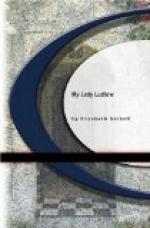“My son!” said my dear lady, stretching out her arms in dumb questioning attitude.
“The Lord gave and the Lord taketh away. Blessed be the name of the Lord.”
But my poor lady could not echo the words. He was the last remaining child. And once she had been the joyful mother of nine.
CHAPTER XII.
I am ashamed to say what feeling became strongest in my mind about this time; next to the sympathy we all of us felt for my dear lady in her deep sorrow, I mean; for that was greater and stronger than anything else, however contradictory you may think it, when you hear all.
It might arise from my being so far from well at the time, which produced a diseased mind in a diseased body; but I was absolutely jealous for my father’s memory, when I saw how many signs of grief there were for my lord’s death, he having done next to nothing for the village and parish, which now changed, as it were, its daily course of life, because his lordship died in a far-off city. My father had spent the best years of his manhood in labouring hard, body and soul, for the people amongst whom he lived. His family, of course, claimed the first place in his heart; he would have been good for little, even in the way of benevolence, if they had not. But close after them he cared for his parishioners, and neighbours. And yet, when he died, though the church-bells tolled, and smote upon our hearts with hard, fresh pain at every beat, the sounds of every-day life still went on, close pressing around us,—carts and carriages, street-cries, distant barrel-organs (the kindly neighbours kept them out of our street): life, active, noisy life, pressed on our acute consciousness of Death, and jarred upon it as on a quick nerve.
And when we went to church,—my father’s own church,—though the pulpit cushions were black, and many of the congregation had put on some humble sign of mourning, yet it did not alter the whole material aspect of the place. And yet what was Lord Ludlow’s relation to Hanbury, compared to my father’s work and place in—?
O! it was very wicked in me! I think if I had seen my lady,—if I had dared to ask to go to her, I should not have felt so miserable, so discontented. But she sat in her own room, hung with black, all, even over the shutters. She saw no light but that which was artificial—candles, lamps, and the like—for more than a month. Only Adams went near her. Mr. Gray was not admitted, though he called daily. Even Mrs. Medlicott did not see her for near a fortnight. The sight of my lady’s griefs, or rather the recollection of it, made Mrs. Medlicott talk far more than was her wont. She told us, with many tears, and much gesticulation, even speaking German at times, when her English would not flow, that my lady sat there, a white figure in the middle of the darkened room; a shaded lamp near her, the light of which fell on an open Bible,—the great family Bible. It was not open at any chapter or consoling verse; but at the page whereon were registered the births of her nine children. Five had died in infancy,—sacrificed to the cruel system which forbade the mother to suckle her babies. Four had lived longer; Urian had been the first to die, Ughtred-Mortimar, Earl Ludlow, the last.




